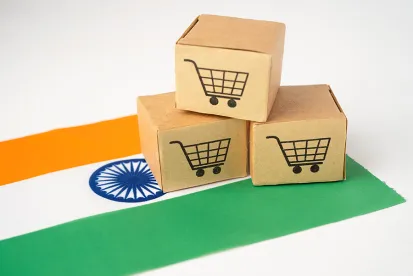With the world moving online, we have seen a shift in the way businesses are reaching out to customers. In the recent past, several brands have launched their own branded e-commerce websites in addition to their products being available on third party platforms. Having their own websites instead of selling through third party e-commerce platforms allows businesses to engage directly with customers giving them an opportunity to understand consumer behaviour and harness consumer data. This also helps them to innovate as per consumer needs and provide customised services. The business may sell goods either directly to consumers on B2C basis i.e. inventory based model OR onboard their distributors as sellers, who in turn sell on B2C basis. In the latter case, the business acts as a marketplace. In either case, goods sold may be either locally manufactured or imported.
In this article, we discuss relevant laws applicable to these models, with special focus on single brands.
FDI RELATED RESTRICTIONS
If the company has foreign direct investment (“FDI”), the Foreign Exchange Management (Non-debt Instruments) Rules, 2019 (“Non-Debt Rules”) will be applicable. The Non-Debt Rules deal with foreign direct investment (“FDI”) in various sectors.
The Non-Debt Rules prohibit FDI in B2C inventory-based model of e-commerce for sale of goods. 100% FDI is permitted in entities involved in manufacturing and such entities are permitted to sell its products manufactured in India through e-commerce websites. Therefore, so long as the single brand business is selling its manufactured goods through e-commerce, the Non-Debt Rules do not create any hurdles. However, the same business is note permitted to sell imported products on the same platform (unless the business also has or intends to have a brick and mortar store), as it would amount to retail trading activity.
If single-brand companies intend to sell imported goods, they would need to comply with conditions under Non-Debt Rules that apply to single-brand product retail trading (“SBRT”). While 100% FDI is permissible in an SBRT company under the automatic route, the law is currently riddled with grey areas. To begin with, the Non-Debt Rules do not define “single brand”. The letter of the law is unclear on whether sale under one house brand but multiple sub-brands is covered under “single brand”. One example where sale through sub-brands appears to have been allowed is Decathlon which has obtained approval for operating as a SBRT in India.1 Decathlon, however, operates multiple sub-brands such as Btwin, Domyos, Quecha, etc.
There are several conditions that entities engaged in SBRT must comply with. These include the requirement to operate a brick and mortar store within two years of the launch of their e-commerce platform. Additionally, SBRT is also subject to local sourcing requirements. Businesses engaging in SBRT must ensure that 30% of the value of the goods procured by them is done from India. For the first five years after launch of the SBRT business (through brick and mortar stores or through e-commerce), the 30% procurement requirement is calculated as an average of the five years beginning from the 1st April of the year of commencement. Thereafter, the 30% procurement requirement is applicable on an annual basis. For the purpose of calculation, all procurements from India by the SBRT (for sale in India or exports) will be calculated. If the business sources from India for global operations (directly or through group companies or through third parties under an agreement), such sourcing can be set off against the 30% requirement. Government should consider relaxing these requirements in their next stage of liberalization for single brands as the brands may contribute to the Indian economy in other ways.
CONSUMER PROTECTION LAWS
The Consumer Protection (E-commerce) Rules, 2020 (“E-Commerce Rules”) regulate e-commerce entities with the aim of protecting consumers. These rules apply to all e-commerce entities operating in India and foreign entities that systematically offer goods or services to consumers in India.
Depending upon whether the brand operates a B2C inventory model, marketplace model or a hybrid model relevant provisions of E-Commerce Rules get triggered.
Some of the key compliances applicable to all types of e-commerce entities are:
-
Nodal officer: The E-Commerce Rules require e-commerce entities to appoint nodal officers or an alternate senior designated functionary to ensure compliance with the Act.
-
Explicit consent for purchase: Recording consent of a consumer’s purchase of any goods or services should only be by way of an explicit and affirmative action. Consent cannot be recorded automatically (including in the form of pre-ticked checkboxes).
-
Grievance redressal mechanism: Entities must establish an adequate consumer grievance redressal mechanism and appoint a grievance officer. Name of the entity with its address of its headquarters and branches, designation and contact details (email, phone etc) of the grievance officer and customer care must be displayed prominently on the platform. This can be achieved by updating the website terms. E-commerce entities are required to ensure that the grievance officer acknowledges the receipt of any consumer complaint within forty-eight hours and redresses the complaint within one month from the date of receipt of the complaint
In addition to the above, certain compliances are applicable only to inventory e-commerce entities including prohibition on posting fake reviews, providing refunds in case goods are defective, ensuring that advertisements are honest and consistent with actual characteristics, access and usage of goods or services offered.
News reports suggest that a further revised draft of amendments to the E -Commerce Rules is in the works.2
OTHER LAWS AND ISSUES
E-commerce entities are subject to several other compliances under various laws. Applicability of such laws depends on the nature of goods sold on the platform. For instance, the Legal Metrology Packaged Commodity Rules, 2011 issued under the Legal Metrology Act, 2009 provide that all packages of pre-packaged food must include certain mandatory declarations. These rules also provide that an e-commerce entity must ensure that such mandatory declarations are displayed on their platform.
Other than the challenges posed by existing laws, businesses are also facing opposition from their offline distributors. As per recent reports, organizations representing distributors have written to businesses focusing on sale through e-commerce against the preferential treatment accorded to their online counterparts.3
The Data Protection Bill, 2021 as proposed by the Joint Parliamentary Committee will entail several additional compliances by the e-commerce entities. The compliances and restrictions are likely to affect processing of children’s data, profiling, etc. The industry should also wait and watch the developments in relation to non-personal data.
Overall, the laws that affect the e-commerce industry are constantly evolving, Taking cue from discomfort of offline distributors, the businesses should consider evolving inclusive strategies




 />i
/>i

